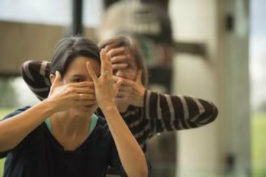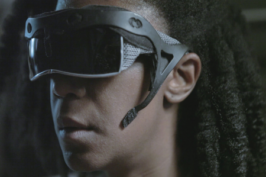Saudi poetess Hissa Hilal made headlines around the world as the first woman to reach the finals of the Arab world’s biggest televised poetry competition, Million’s Poet. The Poetess is the story of a woman risking her personal safety and seizing an opportunity, live on TV in front of 75 million viewers, to use her wit and lyricism to critique patriarchal society and religious extremism.
Using the prime-time tv show as a medium to express her concerns with the current state of society and religion in the Arab world, Hilal uses traditional Beaudoin poetry (known as Nabati poetry) to create a discourse around her concerns. Hilal is no stranger to Nabati poetry, as she has been writing poems since a young age. Under the pseudonym Remia, she published two poetry collections.
A widely cast program would give her a chance to voice her opinions about the fatwas and other issues she sees affecting her culture and society. Hilal decided the show was a way for her to express her views about the Salafi way of life, and the extremism associated with it in current times. After discussing things with her husband, she decided to enter the poetry competition. This is where the film begins; filmmakers Stefanie Brockhaus and Andreas Wolff follow Hilal through her time participating in Million’s Poet.
From a technical standpoint, the film has the feel of a journalist embedded into a particular setting to tell a particular story. In Saudi Arabia, it is not so easy to make a film about a woman in order to tell her story. There are many rules in Saudi Arabia about how women should behave, dress, and often, they require the permission of a man (father/husband/relative) to be out in public. As such, the camera work is at times a bit shaky. This does not take away from the importance of this film and its subject.
Hilal has camera presence. Her words carry power, wisdom, and inspiration. When talking about rules around how women should dress in Islamic countries, she says “the niqab has a sociocultural background…” She explains that in ‘old times’, when Beaudoin people lived in the desert, it was logical to have women wear burqas. Now “it’s not logical. The mistake is that extremists misuse this dress as their symbol.” This symbol keeps women under men’s control. Society has become rigid, and “formality [is more important] instead of nourishing the spirit… When you isolate women, you isolate the soul of society.”
She wouldn’t wear the niqab if she lived elsewhere, she declares. For her “religion is a private matter… religion is manipulated by politics and theology.” Hilal believes by being part of a popular television show and sharing her poetry, she is breaking taboos. She is passionate about Islam, and its vast history. She clearly understands that extremists’ interpretation is “not the true Islam but that of a political religion.” Through her words Hilal wants to help cultivate honesty and self-confidence among women in this region of the world. The impressive thing is she is doing that already.
The Poetess plays Tuesday, April 24th at 6:30pm as a part of the Human Rights Watch Film Festival at TIFF Bell Lightbox.






